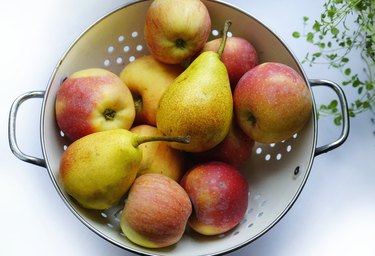
Love fruits, but you're concerned about the calories in a banana, a pear or a juicy apple? Believe it or not, these delicious fruits pack fewer calories than a bag of chips or a slice of pizza. Plus, they're loaded with dietary fiber and antioxidants that make weight loss easier.
Calories in a Banana
Video of the Day
Health professionals worldwide emphasize the importance of fruits in a balanced diet. Along with vegetables, fruits are chock-full of vitamins, minerals, fiber and antioxidants. When consumed regularly, they may lower your risk of heart disease, obesity and even cancer. In fact, low fruit and vegetable consumption contributed to approximately 3.9 million deaths in 2017, reports the World Health Organization.
Video of the Day
If you're like most dieters, you may avoid bananas, apples and pears because of their high sugar content. These fruits, though, boast large doses of fiber, which slows sugar absorption into your bloodstream. Additionally, they're low in calories compared to most snacks.
Bananas, for example, have just 112 calories and 28.8 grams of carbs, including 3.3 grams of fiber and 15.4 grams of sugars per serving (4.4 ounces). They also deliver about 10 percent of the daily recommended potassium intake and 12 percent of the daily recommended allowance of vitamin C.
According to a recent review published in the May 2019 edition of Nutrients, green bananas may promote weight loss and improve glycemic control. Human studies suggest that these fruits may help increase insulin sensitivity, reduce body weight, curb hunger and increase satiety.
Furthermore, they may treat persistent diarrhea and alleviate chronic constipation symptoms. Researchers attribute these benefits to the fiber and starch in bananas.
Apple and Pear Nutrition Facts
With their naturally sweet flavor and juicy flesh, apples and pears are a healthy alternative to sugary treats. These fruits do contain fructose, a natural sugar, but they're also high in fiber and water, filling you up quickly. Pears are 84 percent water. Pear calories are minimal at 95 calories per serving (5.8 ounces), while apples are over 85 percent water and deliver 126 calories per serving (8.5 ounces).
Both fruits contain similar amounts of fiber — about five grams in each serving. Apples are slightly higher in carbs (33.4 grams) than pears (25.3 grams), but the serving size is bigger, too. Whether you prefer apples or pears, you'll get hefty doses of vitamin C, vitamin K, potassium, copper and polyphenols.
According to a meta-analysis of several cohort studies, apple and pear consumption may lower diabetes risk by about 18 percent. As the researchers note, eating just one extra serving of either apples or pears each week may reduce the risk of type 2 diabetes by 3 percent. These findings were published in the March 2017 issue of Food & Function.
Furthermore, a large-scale survey featured in the Nutrition Journal in May 2015 found that whole apples may protect against obesity in children and improve diet quality. Other fruits, such as pears, avocados and mangos, have similar effects. In a study cited by the above journal, overweight women who consumed either apples or pears lost 2.6 pounds on average compared to those eating cookies instead.
It's Not All About Calories
While it's true that calories matter, they're just one piece of the puzzle. Apples, pears, bananas and other fruits abound in nutrients that promote weight loss. You have to look beyond calories and find a way to sneak these foods into your diet.
An October 2016 research paper published in the journal Nutrients confirms the anti-obesity effects of fruits. As the scientists explain, fruit consumption facilitates weight loss and aids in weight management.
Most studies suggest that fiber, polyphenols and other nutrients in fruits modulate the gut flora and keep you full longer, which in turn, helps reduce total food intake.
Fiber, for example, delays gastric emptying and increases satiety. Fruits also contain catechins, naringenin and other phytochemicals that reduce oxidative stress, increase fat breakdown and stimulate fat burning, according to the above review.
Just remember that even the healthiest foods can lead to weight gain if you go overboard. Stick to your calorie goals, watch your portions and fill up on fruits in the morning or before exercise so your body can use the extra calories for fuel.
- WHO: "Increasing Fruit and Vegetable Consumption to Reduce the Risk of Noncommunicable Diseases"
- Joslin Diabetes Center: "How Does Fiber Affect Blood Glucose Levels?"
- USDA: "Nutrition Facts for Bananas"
- Nutrients: "Health Benefits of Green Banana Consumption: A Systematic Review"
- USDA: "Nutrition Facts for Pears"
- USDA: "Nutrition Facts for Apples"
- Food & Function: "Apple and Pear Consumption and Type 2 Diabetes Mellitus Risk: A Meta-Analysis of Prospective Cohort Studies"
- Nutrition Journal: "Consumption of Apples Is Associated With a Better Diet Quality and Reduced Risk of Obesity in Children: National Health and Nutrition Examination Survey (NHANES) 2003–2010"
- Nutrients: "Paradoxical Effects of Fruit on Obesity"